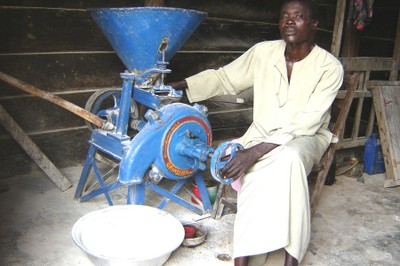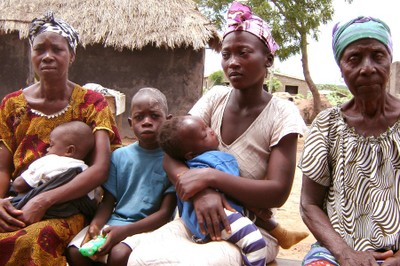Ghana – SOS Medical and Social Centres
In Ghana there are currently four Social Centres and two Medical Centres for children and the local community, including those in Kumaisi and Tema. Many SOS Social Centres operate via Family Strengthening Programmes, which aim to support the wider community. Medical Centres provide treatments and services to the local community. Below is some information about some of the Centres that SOS Children runs in Ghana:
SOS Social Centres around Ghana: In-Depth
 Asiakwa
Asiakwa
Work and Achievements:
In April 2009 the FSP in Asiakwa was expanded and repackaged under a new project called “Farming and Livelihood Improvement Programme” (FLIP). This project has been designed to address the needs of OVCs and youths who are in the most vulnerable circumstances due to poverty, HIV/AIDS, and death of their parents. The FSPs in SOS Children’s Villages Ghana are implemented by 8 staff members and supported by 60 volunteers and 20 community facilitators. (Note that the staff of FSP in the summary statistics is added to that of the day care centre). Asiakwa’s FSP alone counts with 3 staff members to run its program.
Ghana’s FSPs conducted training for caregivers in childcare and parenting in two communities. Caregivers from Asiakwa benefited from family planning, menopause, childcare, and parenting skills training. Many of the caregivers accepted family planning and are currently using some type of modern contraception
For families who do not currently have adequate nutrition, the project provided food packs containing basic but varied foodstuffs. So far, 960 children in total across all three FSPs in Ghana have benefited from these packages. This support, which is a short-term measure, has been given to families in dire need of food and will be reduced gradually as the families’ capacity to feed themselves improves.
In 2009 a total of 315 beneficiary families through all the FSP sites in SOS Children’s Villages Ghana were registered under the National Health Insurance Scheme (NHIS) which guarantees them free medical care for at least one year. The project provided counseling for children with emotional and psychological problems. Families that are not able to afford school fees for their children have been assisted in doing so.
Besides school fees, school uniforms and textbooks have been given to all the children in the programme. Caregivers have been assisted in setting up a business plan based on income generating activities that are economically viable, possible, and acceptable. Support is based on the needs of each caregiver and consists of counseling, equipment, inputs, and loan. A total of 300 caregivers have benefited from these activities.
Tema/ Kasoa
Description of SOS Social Centre/FSP:
The SOS Social Centre offers the following services: family strengthening programmes and HIV/AIDS awareness campaigns, assistance to HIV/AIDS affected persons including the provision of foodstuff, medication, school scholarships, and support with the setting-up of self-help projects. At the SOS Day Care Centre, priority is given to people whose circumstances are particularly difficult, including single mothers, displaced families and families living below the poverty line
Work and Achievements:
As of the of 2009 a count of 866 children and their caregivers benefited from Tema’s and Kasoa’s SOS Family Strengthening Programme (294 from Tema and 572 from Kasoa) with a total of five (5) staff members implementing the programmes in both sites. Tema’s and Kasoa’s FSP beneficiary caregivers benefited from family planning, menopause, childcare and parenting skills training. Many of the caregivers accepted family planning and are currently using some type of modern contraception
SOS Medical Centres around Ghana: In-Depth
Tema
Description of SOS Medical Centre:
The SOS medical centre offers medical services to people from the SOS facilities and from the neighbouring community. It includes one room for medical treatment, one consultation room, a department for the treatment of infectious and non-infectious diseases (two rooms with four beds each), a pharmacy, a reception, a waiting room, and sanitary facilities. About 1500 patients receive medical treatment in the SOS medical Centre every year.
Work and Achievements:
SOS Medical Centre Tema is managed by 2 full-time nurses and one part-time doctor. During the period under review, 1,129 patients received services. The most common ailments reported at the centre were malaria and upper respiratory tract infections with 29 other medical cases being referred to other medical facilities for redress.
The centre offered a seminar on personal hygiene for all the village children. There was also a seminar on HIV/AIDS for the village staff and children.
 Asiakwa
Asiakwa
Description of SOS Medical Centre:
Due to the poor quality of the medical service available in the area surrounding the SOS Children’s Village, the SOS Medical Centre was opened in May 1993. It includes a room for medical treatment, a consultation room, a department for infectious and non-infectious diseases (two rooms with four beds each); a pharmacy, a reception, a waiting room, and sanitary facilities. About 750 patients receive medical care at the SOS Medical Centre every year
Work and Achievements:
SOS Medical Centre Asiakwa provides its services to Asiakwa and the surrounding communities. It is managed by a resident nurse and two Senior Medical Officers who were engaged during the year as locum doctors to assist in the clinical work. The presence of medical officers at the clinic is a requirement for registering our clinic with the National Health Insurance Scheme. A total of 405 patients visited the centre in 2009. It is still observed that almost all of the cases reported at the centre are malaria related. Other cases include respiratory tract infections and skin diseases.
Kumaisi
Description of SOS Medical/Social Centre:
An SOS Social Centre combined with an SOS Medical Centre was opened with the aim of providing medical care to the people in the neighbourhood, informing them about local prevention measures, providing families in need with social and material assistance and offering counselling regarding child education and career guidance for parents. The centre comprises rooms for consultation, treatment, isolation and observation as well as a room for sterilizing equipment, a dispensary and rooms for the director, the educators and the social workers.

 Return to Schools Wikipedia Home page…
Return to Schools Wikipedia Home page…
